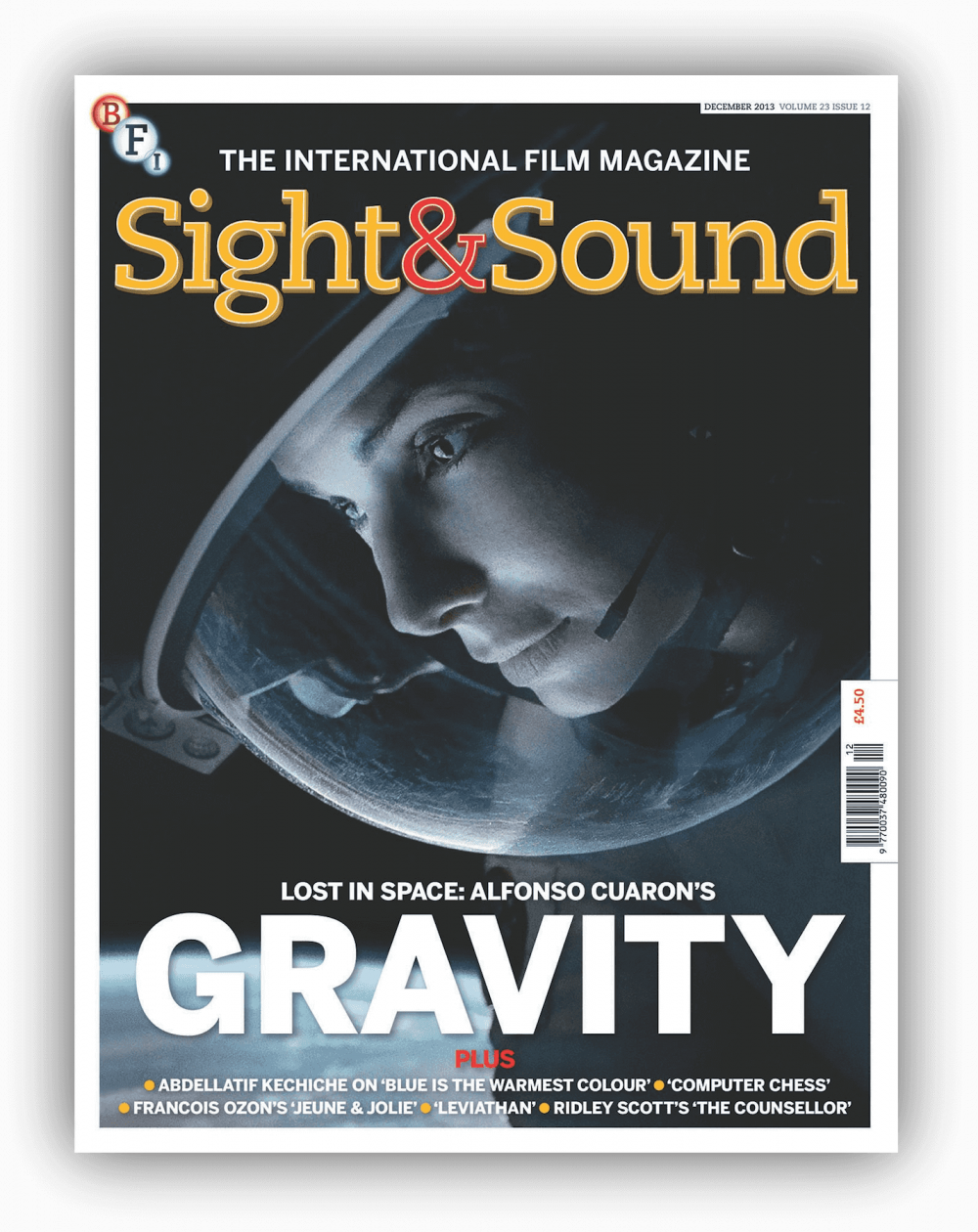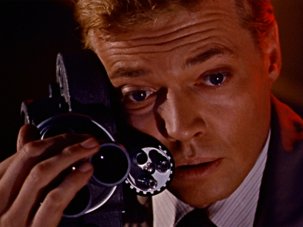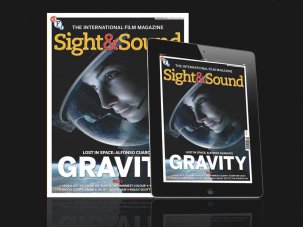
This month’s issue boldly goes into outer space as our cover feature explores the immersive 3D technical marvel that is Alfonso Cuarón’s Gravity.
|
Posted to subscribers and available digitally 1 November On UK newsstands 5 November |
Roger Luckhurst considers the film, and looks back at the ways in which earlier films have depicted the experience of being in space. “There has always been a strange interplay between the American military-industrial complex and science-fiction cinema”, he writes, drawing on movies from Destination Moon in 1950 through Star Wars, Capricorn One, 2001: A Space Odyssey, Dark Star and Apollo 13, and argues that the fantasies of science-fiction cinema and the realities of mankind’s ventures beyond the Earth’s atmosphere have never been too far apart.
Gravity captures the sensation of actually being in zero-gravity orbit around the Earth with a verisimilitude like no film before it, largely due to the technical innovations developed during production. Director Alfonso Cuarón and visual effects supervisor Tim Webber discuss the film’s production, and cinematographer Emmanuel Lubezki’s eureka! moment at a Peter Gabriel concert.
Technical innovations also made possible the remarkably immersive Leviathan, an abstract nonfiction portrait of industrial fishing off the coast of New Bedford, Massachusetts. The film’s directors Lucien Castaing-Taylor and Verena Paravel tell Trevor Johnston how their work attempts to avoid the point of view imposed by conventional documentary in favour of a more direct experience.
Technology of a different, more antiquated kind is crucial to Andrew Bujalski’s early-80s set Computer Chess, shot on the video technology of the time. Is this return to analogue a symptom of nostalgia, asks Calum Marsh, or something more forward-looking and exciting?
In a very different vein is Abdellatif Kechiche’s Palme d’Or winner Blue is the Warmest Colour, a three-hour long story about a love affair between two young French women which rests on the more traditional virtues of script and performances, but pushes both to great depths through long takes and a relentless search for realism. The film’s explicit sex scenes have been a particular cause for controversy, with some seeing a male perspective. But as Kechiche tells Jonathan Romney: “I find [that criticism] really empty. We’re talking about love – it’s absolute, it’s cosmic.”
The sex life of a young French woman is also at the heart of François Ozon’s coolly provocative new coming-of-age new film Jeune & jolie. The director tells Nick Roddick how he wanted to capture a different vision of adolescence to that seen in most other French dramas.
Elsewhere, Peter Hames writes on the Polish director Agnieszka Holland’s new project Burning Bush, a series for HBO which examines the reality of ‘normalisation’ – the repression that followed the Prague Spring.
Also in this month: Nick Pinkerton on the great romantic and professional partnership between Roberto Rossellini and Ingrid Bergman, Ben Walters on the freakish imagery, local concerns and universal emotion in the work of Portuguese director João Pedro Rodrigues, Charles Gant on how Saving Mr. Banks was brought to the screen – and much, much more…
-
Sight & Sound is now available in digital editions for Apple iOS, Android and Kindle Fire as well as computer desktops. Scroll this gallery to browse this issue’s sections.
-
RUSHES: an exhibition exploring the style of The Innocents; the BFI Player; five key lesbian dramas; Richard Deming on Welles’s rediscovered Too Much Johnson; Hannah McGill is bowled over; Mark Cousins on the tyranny of the Q&A
-
THE INDUSTRY: Saving Mr. Banks; the return of Woody Allen; funding children’s films; Lars Jönsson, producer of Lukas Moodysson
-
FESTIVALS: Demetrios Matheou in San Sebastián
-
Gravity tries to depict the actual dangers of spaceflight. Roger Luckhurst looks at the narrow gap between cinematic fantasy and chilly reality. PLUS Alfonso Cuarón and vfx supervisor Tim Webber on the challenge of creating zero gravity in the studio
-
Czech and Slovak filmmakers have struggled to capture the reality of ‘normalisation’ – the repression that followed the Prague Spring. Now, says Peter Hames, a Pole, Agnieszka Holland, has succeeded
-
When it comes to 80s period authenticity, Andrew Bujalski’s Computer Chess has got it taped, thanks to the magic of old-fashioned video technology. Calum Marsh asks what the return of analogue means
-
Abdellatif Kechiche’s Blue Is the Warmest Colour has caused no small amount of controversy since winning Cannes’ Palme d’Or, not least for the perceived male slant to its depiction of a lesbian love affair. Jonathan Romney talks to the director
-
An abstract painting set to a musique concrète soundtrack, an ocean-going Le Sang des bêtes, a Moby-Dick for trawlermen – Leviathan is both a documentary about the fishing industry, and something far more rich and strange. By Trevor Johnston
-
François Ozon’s latest film, Jeune & jolie, is a cool, provocative blend of teen coming-of-age drama and Belle de jour, overlaid with a Françoise Hardy soundtrack. The director talks to Nick Roddick about sex, money and the modern teenager
-
WIDE ANGLE: Portuguese director João Pedro Rodrigues; An Occurrence at Owl Creek Bridge; Pordenone’s silent film festival; an extraordinary film inspired by the Swiss novelist Robert Walser; Queer Lisboa
-
FILMS OF THE MONTH: Blue Is the Warmest Colour, Child’s Pose, The Counsellor, Jeune & jolie, plus 38 more new releases reviewed
-
HOME CINEMA: a trio of Rossellini films starring Ingrid Bergman; the cerebral, dreamy Riddles of the Sphinx; a classic series of British television plays; Australian psycho-family psychodrama The Boys, plus 14 other releases
-
BOOKS: Furious Cool: Richard Pryor and the World That Made Him; After Dracula: The 1930s Horror Film; Working Together: Notes on British Film Collectives in the 1970s; The Cinema of Sergei Parajanov
-
ENDINGS: Ashley Clark on Horace Ové’s Pressure
Features
Cover feature: Space is the place
Alfonso Cuarón’s Gravity tries to depict the dangers of spaceflight realistically. But the fantasies of science-fiction cinema and the realities of mankind’s ventures beyond the atmosphere have never been too far apart. By Roger Luckhurst.
Plus: Leaving the earth behind
Gravity director Alfonso Cuarón and the film’s visual effects supervisor Tim Webber, of London’s Framestore, explain the unique challenges of realising the film’s zero-gravity setting.
Fight fire with fire
Czech and Slovak filmmakers have struggled to capture the reality of ‘normalisation’ – the repression that followed the Prague Spring. Now a Pole, Agnieszka Holland, has succeeded, with Burning Bush, a TV series that begins with the self-immolation of Jan Palach. By Peter Hames.
Past masters
When it comes to 1980s period authenticity, Andrew Bujalski’s Computer Chess has got it taped, thanks to the magic of old-fashioned video technology: and Bujalski’s not alone. Is this return to analogue a symptom of nostalgia, a protest against digital – or something more? By Calum Marsh.
Women in love
Abdellatif Kechiche’s Blue is the Warmest Colour has caused no small amount of controversy since winning the Palme d’Or in Cannes – not least because of a perceived male slant to its depiction of a lesbian love affair. But, says the director, you might as well tell him he has no right to film the life of an airline pilot because he can’t fly. By Jonathan Romney.
All at sea
An abstract painting set to a musique concrète soundtrack, an ocean-going Le Sang des bêtes, a Moby-Dick for trawlermen – Leviathan is both a documentary about the fishing industry, and something far more rich and strange. By Trevor Johnston.
Plus: Realm of the sensory
Leviathan is the latest in a line of adventurous documentaries from Harvard’s Sensory Ethnography Lab that set out to experience the real world, not just talk about it. By Trevor Johnston.
Love for sale
François Ozon’s latest film, Jeune & jolie, is a cool, provocative blend of teen coming-of-age drama and Belle de jour, overlaid with a Françoise Hardy soundtrack. Ozon talks about sex, money and the modern teenager. By Nick Roddick.
Regulars
Editorial
Lost for words
Rushes
In the frame: The haunting of Deborah
A new exhibition at BFI Southbank explores the style and sensibility of The Innocents, one of the eeriest and most beautiful gothic films. By Nathalie Morris.
Object lesson: Sphere of influence
Masculine, feminine, a blue-collar art form and a rich man’s plaything – a humble bowling ball can be the whole world. By Hannah McGill.
The five key… Lesbian dramas
Blue Is the Warmest Colour is only the most recent in a line of films that have tried to show the reality of lesbian relationships. By Salina Robertson.
Digital: Playing at home
The newest kid on the VoD block, the BFI Player, aims to add something fresh to the online video experience. By Catherine Bray.
Discovery: Not enough Orson
Rediscovered footage from an early Welles film project, Too Much Johnson, may not be revelatory, but the director always springs surprises. By Richard Deming.
Dispatches: Not so grand inquisitors
Filmmakers and festival audiences are oppressed by the tyranny of the Q&A. Couldn’t they just, you know, talk to each other? By Mark Cousins.
The Industry
Development tale: Saving Mr. Banks
The big problem with telling the story of P.L. Travers – the need for Disney’s cooperation – turned out to be no problem at all. By Charles Gant.
The Numbers: Blue Jasmine
Brewster: Doing it for the kids
There’s broad agreement that supporting family films is a good thing: not so much about what counts as a family film. By Ben Roberts.
Profile: Lars Jonsson
The Swedish producer has found international success by staying small and nurturing relationships with directors. By Geoffrey Macnab.
Festivals
San Sebastian: shell shock
Venezuela triumphs in the Basque country. Plus marital war, anchovy war, How I Won the War, and sex, death and horses in Iceland. By Demetrios Matheou.
Wide Angle
Profile: mysteries of Lisbon
The freakish imagery, local concerns and everyday, universal emotion of the Portuguese director João Pedro Rodrigues. By Ben Walters.
Soundings: the nature of death
How Southern gothic with a French accent became an American TV classic: you are entering The Twilight Zone. By Frances Morgan.
Primal screen
Ukrainian lyricism and satire and Wellesian beginnings at Pordenone’s Giornate del Cinema Muto. By Geoff Brown.
Preview: The mighty walser
From a story by Robert Walser, a choreographer and a director have made a mesmerising piece of ‘perambulatory poetics’. By Sukhdev Sandhu.
Festival: Outside in
As queer cinema starts to converge with the mainstream, the Queer Lisboa festival questions where the boundaries lie. By Ben Walters.
Reviews
Films of the month
Blue is the Warmest Colour/La Vie d’Adèle Chapitres 1 et 2
Child’s Pose/Pozitia copilului
The Counsellor
Jeune & jolie
plus reviews of
Baggage Claim
Battle of the Year
Breakfast with Jonny Wilkinson
Bring Me the Head of the Machine Gun Woman
Cloudy with a Chance of Meatballs 2
Computer Chess
Day of the Flowers
Dirty Wars
Dom Hemingway
Don Jon
Either Way/Á annan veg
Ender’s Game
Escape Plan
The Family/Malavita
Future My Love
Gravity
The Haunting in Connecticut 2: Ghosts of Georgia
How to Survive a Plague
In Fear
Leviathan
Love Tomorrow
Marius
Metallica Through the Never
Milius
Pandora’s Promise
Parkland
Romeo & Juliet
Runner Runner
Rurouni Kenshin
Saving Mr. Banks
Seduced and Abandoned
Sunshine on Leith
Utopia
uwantme2killhim?
V/H/S/2
¡Vivan las antípodas!
Who Needs Enemies
Wolf Children
Home cinema
DVD features
From plaster saint to pilgrim: 3 Films by Roberto Rossellini Starring Ingrid Bergman
In 1947 Ingrid Bergman wrote a letter to Roberto Rossellini – and one of cinema’s great partnerships was born. By Nick Pinkerton.
Rediscovery: Riddles of the Sphinx
Memories, myths and radical politics all converge in a gloriously experimental film exploring the mystery of the Sphinx. By Charlie Fox.
plus reviews of
Barbara Broadcast
Bullfighter and the Lady
Camille redouble
Children’s Film Foundation Collection: Scary Stories
The Mummy
La notte
Red River
Streets of Fire
Take it or Leave it
Time Bandits
The Witches
Television
Plays for Britain
In the 1970s, TV plays made headlines, and the one-off drama was the favoured form for tackling urgent social issues. By Mark Duguid.
Plus reviews of
Portlandia – Seasons 1 & 2
Selling Hitler
Young Montalbano – Collection 1
Lost and found
Sons of Australian anarchy
Currently unavailable on DVD, The Boys is a ferocious family drama with a magnetic performance by David Wenham. By Austen Collings.
Books
Nick Pinkerton on a life of Richard Pryor.
Kim Newman is mildly thrilled by a collection of essays on the 1930s horror movie.
Sukhdev Sandhu on UK film collectives of the 1970s.
Michael Brooke welcomes the first English-language study of Sergei Parajanov.
Letters
Smiling endings, cuts of The Wicker Man, archiving the silent era, Eddie Marsan’s Tyrannosaur, fainting or dying in The Great Beauty.
Endings
Pressure
Sympathy struggles with mockery in the abrupt, defeated conclusion of Horace Ové’s drama about Black Power in Britain. By Ashley Clark.







